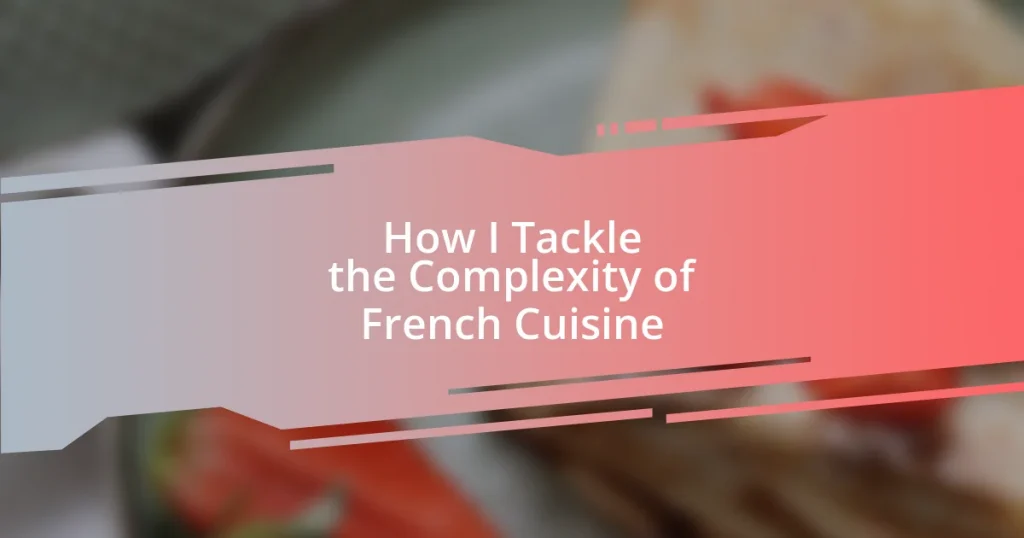Key takeaways:
- French cuisine emphasizes quality ingredients and traditional techniques, creating opportunities for creativity and balance in cooking.
- Mastering essential techniques and classic dishes, such as Coq au Vin and Bouillabaisse, enhances culinary skills and connects the cook to French culture.
- Efficient meal prep strategies and thoughtful wine pairings elevate the dining experience and facilitate joyful cooking, emphasizing the importance of organization and community in French culinary culture.
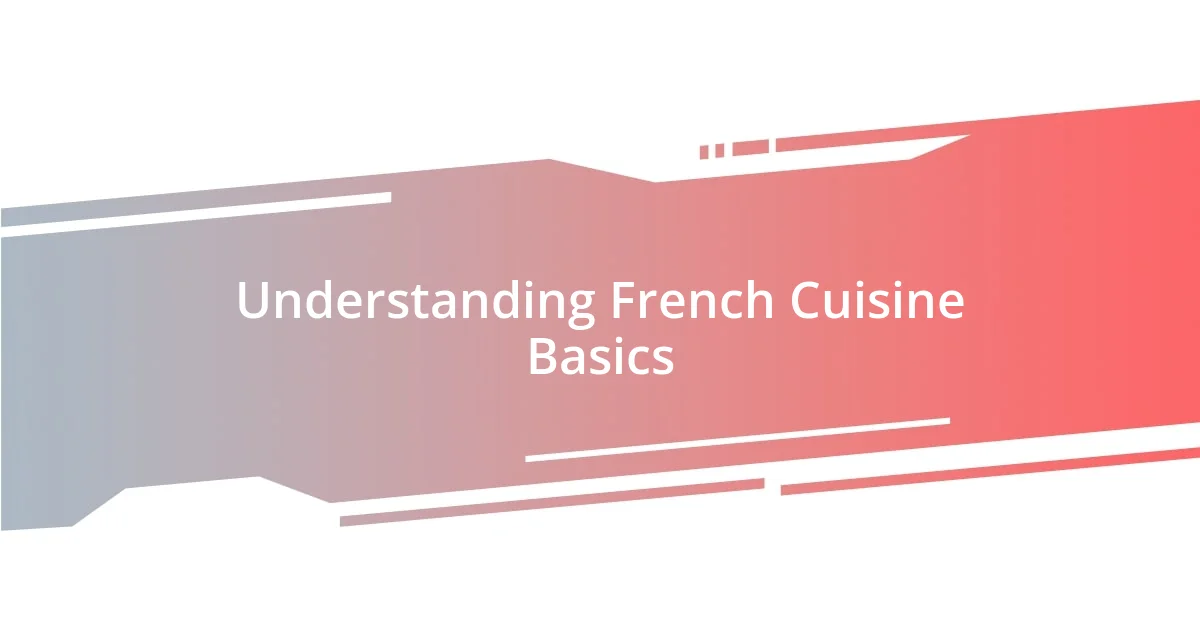
Understanding French Cuisine Basics
French cuisine is often celebrated for its complexity, but at its heart lies a deep respect for quality ingredients and traditional techniques. I still remember the first time I sautéed onions in a pan with a little butter; the aroma filled my kitchen and instantly transported me to my grandmother’s home in France. Isn’t it fascinating how a simple act can evoke such vivid memories?
Fundamental to French cooking are the classic techniques like sautéing, braising, and poaching. Each method holds an intricate world of flavors waiting to be unveiled. I find it exhilarating to experiment with these techniques, often asking myself, “How can I elevate this dish?” This mindset transforms a meal into an opportunity for creativity rather than just a routine task.
Moreover, the philosophy behind French cuisine emphasizes balance and harmony. When I prepare a dish, I always think about how the flavors will complement each other, much like a well-composed piece of music. Have you ever considered how the interplay of sweet and savory can turn a good meal into a remarkable one? That delicate balance is what truly captivates the palate and makes French cuisine an art form in itself.

Essential Techniques for Cooking
Essential techniques for cooking in French cuisine are pivotal in transforming simple ingredients into exquisite dishes. I remember the first time I tried the technique of emulsifying during a homemade vinaigrette session. I watched the oil and vinegar dance together, creating a creamy mixture that burst with flavor. It’s an art that might seem daunting, but practice makes it feel second nature, enabling me to infuse dishes with personality and depth.
Another essential technique is beurre blanc, a butter-based sauce that highlights the beauty of balance. The first time I poured it over a perfectly seared piece of fish, the richness of the sauce blended seamlessly with the delicate flavor of the fish. It sparked a realization: mastering sauce techniques is often the key to elevating your cooking, adding that special touch that leaves guests impressed and asking for more.
Braising, with its slow and gentle cooking, is yet another cornerstone of French cuisine. The first time I attempted it with beef, I was amazed at how the meat transformed into tender perfection, bathing in aromatic herbs and vegetables. This was my lightbulb moment: cooking is not just about following a recipe; it’s about patience and allowing flavors to develop over time.
| Technique | Description |
|---|---|
| Sautéing | Cooking quickly in a small amount of fat over high heat |
| Braising | Slow cooking in a small amount of liquid |
| Poaching | Gently cooking in simmering liquid |
| Emulsifying | Combining two liquids that normally don’t mix, like oil and vinegar |
| Making Sauces | Key method for adding flavor and depth to dishes |
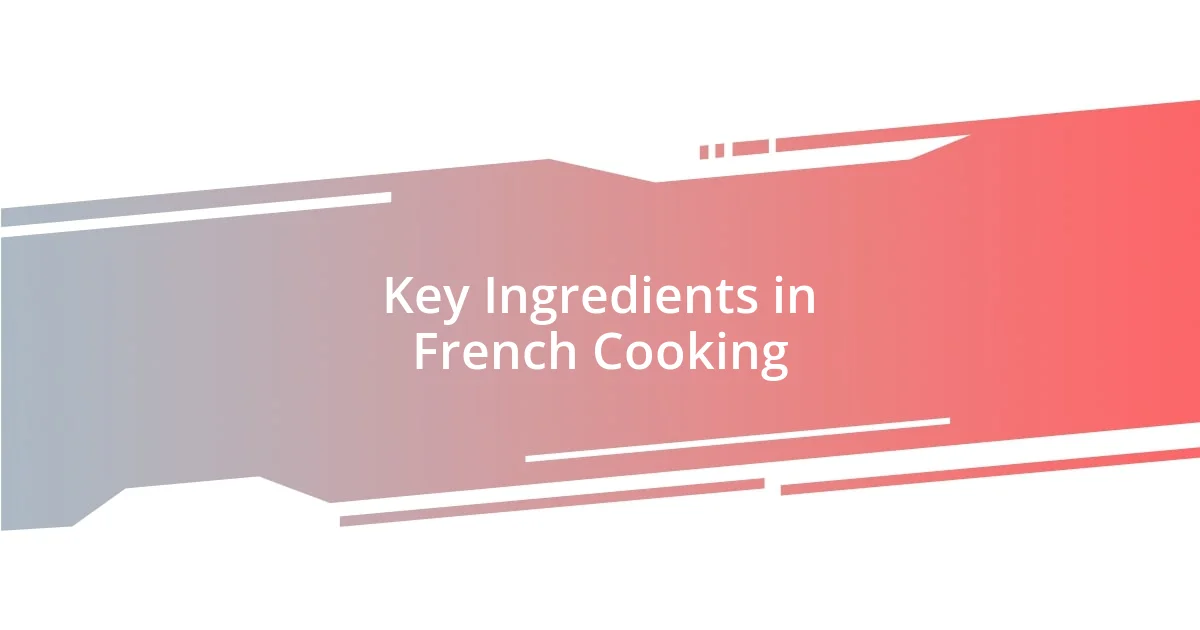
Key Ingredients in French Cooking
When diving into French cuisine, the ingredients hold extraordinary importance, shaping both the flavor and character of each dish. I vividly remember the first time I used fresh herbs like tarragon and thyme; their fragrant notes transformed my kitchen into a Parisian bistro. The way these ingredients enhance each dish never ceases to amaze me.
Key ingredients that define French cooking include:
- Butter: Essential for its rich flavor and versatility in sauces.
- Garlic: Adds depth and aroma, often a foundation in many dishes.
- Onions: Their sweetness when caramelized brings harmony to flavors.
- Fresh Herbs: Such as parsley, basil, and chives, that elevate the freshness.
- Wine: A common ingredient, used in both cooking and as a pairing to enhance overall flavor.
Imagining a velouté—where butter, flour, and stock unite to form a silky sauce—always inspires me. Those fundamental elements can create something complex and inviting with just a few simple steps. Just like how the best memories start with quality ingredients, every great dish does too.
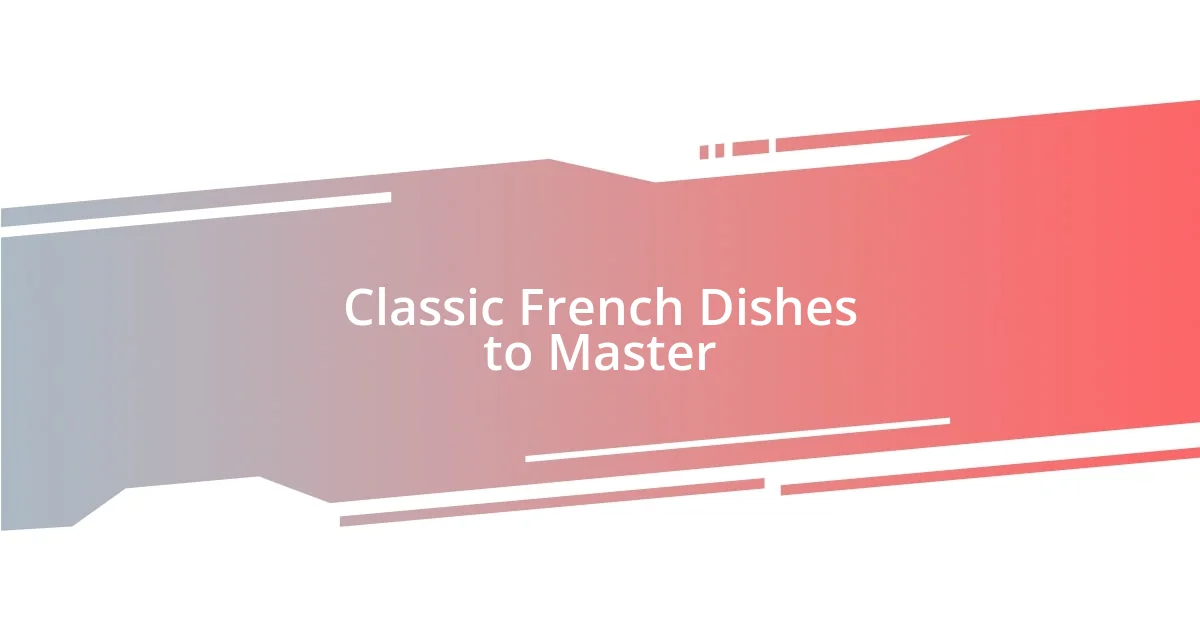
Classic French Dishes to Master
Mastering classic French dishes can feel like a delightful journey into a culinary treasure chest. One of my absolute favorites is Coq au Vin, a dish steeped in rich history and bold flavors. I remember when I first attempted this, the intoxicating aroma of chicken simmering in red wine alongside mushrooms and lardons filled my kitchen. It felt like the essence of France itself was captured in that pot. Is there anything more comforting than knowing you’ve created something that embodies tradition and heart?
Then there’s Bouillabaisse, the iconic fish stew from Provence. As I stirred the broth, infused with saffron and fennel, I couldn’t help but think about the coastal fishermen who’ve crafted this dish for generations. Each bite felt like a connection to the Mediterranean sea. What’s incredible is how, with every serving, I could recreate that sun-soaked identity of the South of France right in my own home.
Finally, I can’t talk about classic French dishes without mentioning Crêpes. The first time I whipped a batch of batter, the anticipation of flipping those delicate rounds was thrilling. I vividly remember the first crêpe I served, warm and filled with Nutella, and the pure joy on my friend’s face. It made me realize how simple yet impactful these dishes can be. They often transport you beyond the kitchen and into those magical moments shared with loved ones. How can something so simple stir such profound emotions? That’s the beauty of French cuisine.

How to Pair French Wines
Pairing French wines requires an appreciation of both the wine and the dish. I remember hosting a dinner where I served a classic Ratatouille, bursting with summer vegetables sautéed to perfection. I instinctively reached for a chilled Rosé from Provence, and the way the wine balanced the dish—with its acidity cutting through the rich flavors—felt like a dance in perfect harmony. Have you ever experienced that moment when the right wine elevates the meal into something truly special?
When it comes to richer dishes, I often opt for a robust red, like a Bordeaux. I once served a coq au vin with a delightful 2016 Château Haut-Cantin, and the depth of flavors was phenomenal. Those rich dark fruits in the wine complemented the succulent braised chicken beautifully. It made me realize that the right wine can not only enhance the dish but also tell a story of its terroir, echoing the landscapes of France with each sip.
And let’s not forget about dessert; pairing a sweet Sauternes with a tart Tatin is a revelation. I vividly recall the first time I took that first bite, the caramelized pastry dancing with the luscious sweetness of the wine. It was one of those occasions where I thought, “How can something so indulgent also feel so effortless?” The right pairing transforms food into an experience that lingers long after the last bite is savored.

Tips for Efficient Meal Prep
Meal prep in French cuisine can seem daunting, but I’ve found some tried-and-true strategies that make a world of difference. One of my go-to tips is to plan a theme for the week. For instance, I once dedicated a week to mastering sauces—think Béchamel, Velouté, and Hollandaise. By having a clear focus, not only was I able to streamline my shopping list, but I also discovered the joy of learning that each sauce opened up even more culinary possibilities.
Another efficiency tip stems from multitasking. When I roast vegetables for a Ratatouille, I always pop a few extra trays in the oven. The leftovers become the base for a quick quiche or a vibrant soup the next day. This simple practice saves time while ensuring that nothing goes to waste. Have you ever noticed how a little foresight can yield such rewarding results?
Lastly, organization is key. I’ve learned that having all your ingredients washed, chopped, and pre-measured before cooking helps avoid the chaos that can unfold while you’re focused on the stovetop. I’ll never forget that one evening when I was racing against time to prepare a dinner party. With everything prepped and lined up, I not only finished ahead of schedule but also enjoyed my time in the kitchen instead of feeling overwhelmed. Isn’t it amazing how a little preparation can turn the kitchen into a place of joy rather than stress?
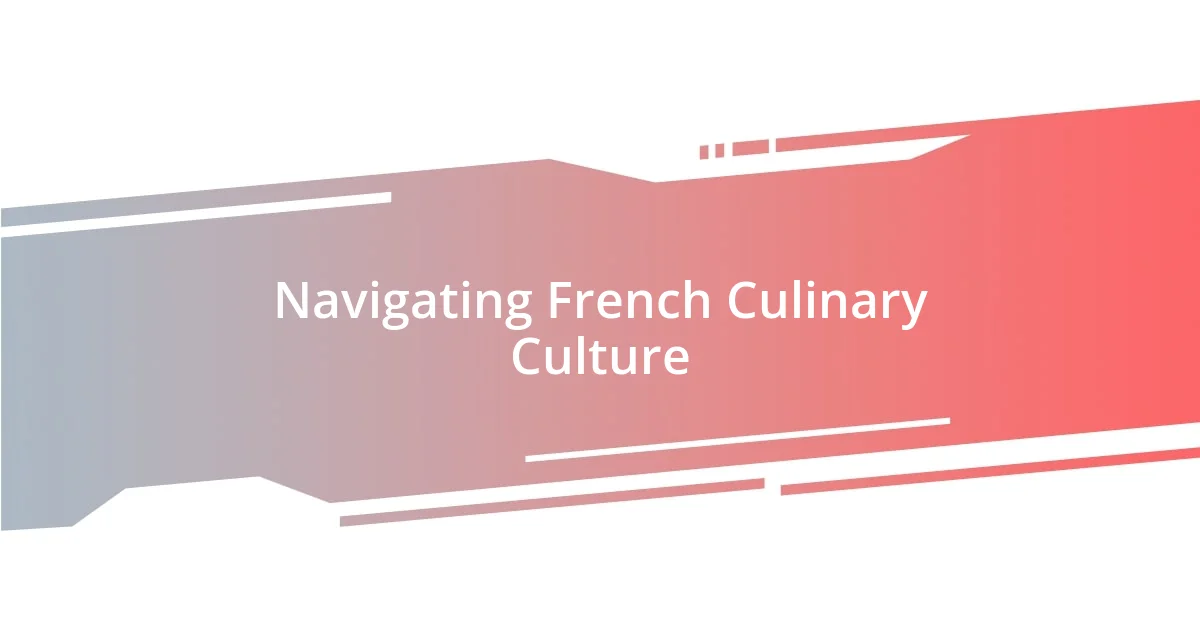
Navigating French Culinary Culture
Exploring French culinary culture is like stepping into an intricate dance of tradition and innovation. I remember the first time I attended a French cooking class; the air was thick with the scent of garlic and herbs, and I felt a sense of excitement mixed with nervousness. As we learned to create a simple onion soup, I realized that every ingredient had its purpose, weaving together a story that spans generations. Have you ever felt how cooking can connect you to a culture in a profound way?
One aspect that continually fascinates me is the French emphasis on technique. In my experience, mastering knife skills is pivotal—it’s not just about cutting; it’s about respecting the ingredients. I recall a moment when I was struggling to julienne vegetables, and my instructor gently reminded me that consistency leads to not only presentation but also cooking time. That insight has stuck with me. What do you think makes a dish truly shine—the ingredients, the technique, or perhaps a bit of both?
French culinary culture also celebrates community and conviviality. I cherish the evenings spent sharing meals with friends, where every dish sparks conversations and laughter. During one such gathering, a friend shared her family recipe for coq au vin, and as we sat around the table, the warmth of that dish created a bond among us. Have you ever noticed how food can transform a simple gathering into a memorable occasion? It’s these moments that remind me of the true essence of French cuisine: connecting with others through shared experiences and flavors that linger long after the last bite.










